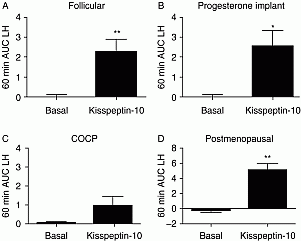ICEECE2012 Oral Communications Female Reproduction Clinical (6 abstracts)
Kisspeptin-10 stimulation of gonadotropin secretion in women is modulated by sex steroid feedback
J. George 1 , R. Anderson 1 & R. Millar 1,
1University of Edinburgh, Edinburgh, UK; 2University of Cape Town, Cape Town, South Africa; 3University of Pretoria, Pretoria, South Africa.
Background: Sex-steroid feedback regulates gonadotropin (LH and FSH) secretion. Kisspeptin, a novel hypothalamic neuropeptide, stimulates gonadotropin secretion by stimulating GnRH secretion, and has been shown in animal models to play a central role in mediating sex steroid feedback.
Hypothesis: As estrogen feedback occurs at both the hypothalamus and the pituitary in women, we hypothesized that the stimulatory effect of kisspeptin-10 would be dependent on prevailing sex-steroid milieu.
Methods: Responses to intravenous kisspeptin-10 (0.3 μg/kg) in women in the follicular phase (n=10) were compared with a low sex steroid/high gonadotropin condition (post-menopause, n=6) and with a high sex steroid/low gonadotropin condition (combined contraceptive pill, n=4; progestogen contraceptive implants, n=4). 60-min AUC of gonadotropin secretion before and after kisspeptin-10 were compared using paired t-tests. By deducting 60-min mean baseline value from observed gonadotropin concentrations, inter-individual variability in baseline secretion was controlled for.
Results: Kisspeptin-10 stimulated LH secretion in follicular phase (ΔAUC 2.3±0.8 IU/l × h, P=0.009), post-menopausal (5.3±0.9 IU/l × h, P=0.002) and progestogen implant (2.6±0.8 IU/l × h, P=0.05) groups but not in women taking the combined pill (0.9±0.4 IU/l × h, P=0.13).
FSH secretion was significantly increased only in post-menopausal women (ΔAUC 2.6±0.8 IU/l × h, P=0.03) with changes of <0.5 IU/l × h observed in the other three groups.
Gonadotropin responses in post-menopausal women were significantly larger than the other groups (one-way ANOVA analysis of ΔAUC; LH (P=0.012) and FSH (P=0.001)) without significant differences between the other groups.
Conclusions: Gonadotropin responses to kisspeptin-10 in women are enhanced in sex-steroid deficient post-menopausal women and suppressed in women taking pharmacological doses of exogenous estrogen and progestogen. Moreover, in keeping with other studies of kisspeptins, kisspeptin-10 preferentially stimulates LH over FSH.
These results are consistent with the notion that the pituitary gonadotrope is a functionally important locus of estrogen feedback in women and also inform potential translational applications of kisspeptin in reproductive endocrine disorders.

Figure 1 60-min AUC of LH before and after i.v. administration of 0.3 μmg/kg kisspeptin-10 to healthy women. A, women in follicular phase (n=10); B, women using progesterone implants for contraception (n=4); C, women taking combined oral contraceptives (n=4); D, postmenopausal women (n=6).
Declaration of interest: The authors declare that there is no conflict of interest that could be perceived as prejudicing the impartiality of the research project.
Funding: This work was supported, however funding details are unavailable.
 }
}



